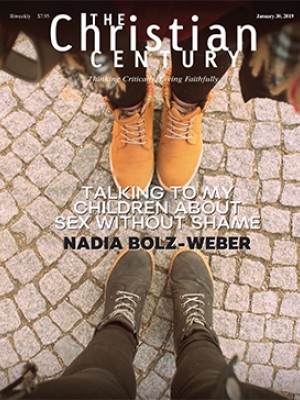February 24, Epiphany 7C (Genesis 45:3–11, 15; Luke 6:27–38)
What if I’m the cheek-slapper, the thief, the opportunist?
If I am honest, this week’s readings are some of my least favorite in the entire three-year lectionary cycle. One reason they make me uneasy is that they are so often weaponized.
In the story of Joseph’s emotional reunion with his brothers, he appears to have come to a place of peace about their profound betrayal. They intended to kill him but decided instead to leave him for dead. He was then sold into slavery, and when his brothers couldn’t find him where they left him, they faked his death. Joseph went from slavery to relative privilege, then to prison after being falsely accused of rape. He languished there for years until he was remembered when the pharaoh needed help interpreting a dream. Joseph then enjoyed prominence as the second most powerful man in Egypt. Now, when he is confronted by his family’s desperation, he interprets this as divine providence. He reunites with his father and full-blood brother, saves them all from starvation, and brings them to Goshen to live in security.
All’s well that ends well, right?
In Luke’s account of Jesus’ famous sermon, Jesus admonishes his hearers to “do good to those who hate you” and “pray for those who abuse you.” Offer the other cheek to the person who strikes you in the face. If someone takes something from you, don’t ask for them to return it.
Read our latest issue or browse back issues.
“If you are silent about your pain,” said Zora Neale Hurston, “they’ll kill you and say you enjoyed it.” Christians have often encouraged people to be silent about their pain, using the Bible as our justification. I have too many personal anecdotes of how these texts have been employed to silence the victimized so that others are not discomfited or inconvenienced by their difficult stories. More nefariously, we have used Jesus’ words to actively encourage vulnerable people to stay in abusive environments and relationships. In this way, we have led people to their own slaughter and have done so in the name of Christ.
As a minister who works to cultivate racial justice in the church and the world, the most frequent pushback I receive involves questions about forgiveness and “not harping on the past.” To these kind and well-meaning detractors, the most appropriate Christian thing to do is to either forget the past or find something redeeming about it. In either case, any mention of present pain is an indication of lingering animosity over something that happened long ago (but presumably is not happening today). It remains for me the saddest of ironies that so many Christians would see someone else die in their pain rather than die to their own indifference or their need to feel secure in the world’s rightness.
I believe it’s this misuse of the text—rather than outright hostility from avowed enemies—that presents the biggest threat to the church truly embracing its call to justice and genuine siblinghood.
Another reason these texts bother me is that they challenge me. I don’t want to give more of myself to people who are already taking so much. Those familiar with the sting of a slap aren’t quick to submit to it. That’s just not consistent with human nature. I don’t have siblings, but if I did and if they did anything to me like what Joseph’s brothers did to him, I can’t imagine I’d be quite so conciliatory. I fight with the text because I want to know why it asks so much more from the victimized than from the victimizer. I’m also reminded that being victimized doesn’t strip me of all power. Even at the receiving end of someone’s bad behavior, I can control my own response. I still have agency. The text challenges me as to how I will use that agency in those moments.
Oh, and often I am the person delivering the slap, putting myself at the mercy of the victim and how they will use their own agency. Sometimes I am the person Jesus is talking about here, not the one to whom he is talking.
I read these texts at a crossroads. I am a person with intersecting areas of both privilege and marginalization. I am a black woman in a culture of patriarchy and white supremacy. I am also a straight, cisgender, married person in a culture that privileges all three. At any time, I can read my experience in the text from either end of the power imbalance. This is perhaps what bothers me most about these texts: I don’t always know who I am in them.
As a Christian in the Reformed tradition, I believe that even the best parts of us are influenced by and susceptible to sin. Preachers who preach from these texts may be tempted to place their hearers only in the role of the one who is slapped or betrayed. What if we told the story through the lens of the desperate brother with the checkered past? What if the preacher brought the assumption that the hearers (and the preacher) are the slapper, the thief, or the opportunist who takes advantage of a vulnerable person? Because the truth is we often are, and that realization is an affront to the way we like to view ourselves and our place in the world. We’re the good ones, the ones who live to make things better—until we’re not.
I hope these texts discomfit all of us. And I hope they do so for the right reasons.






